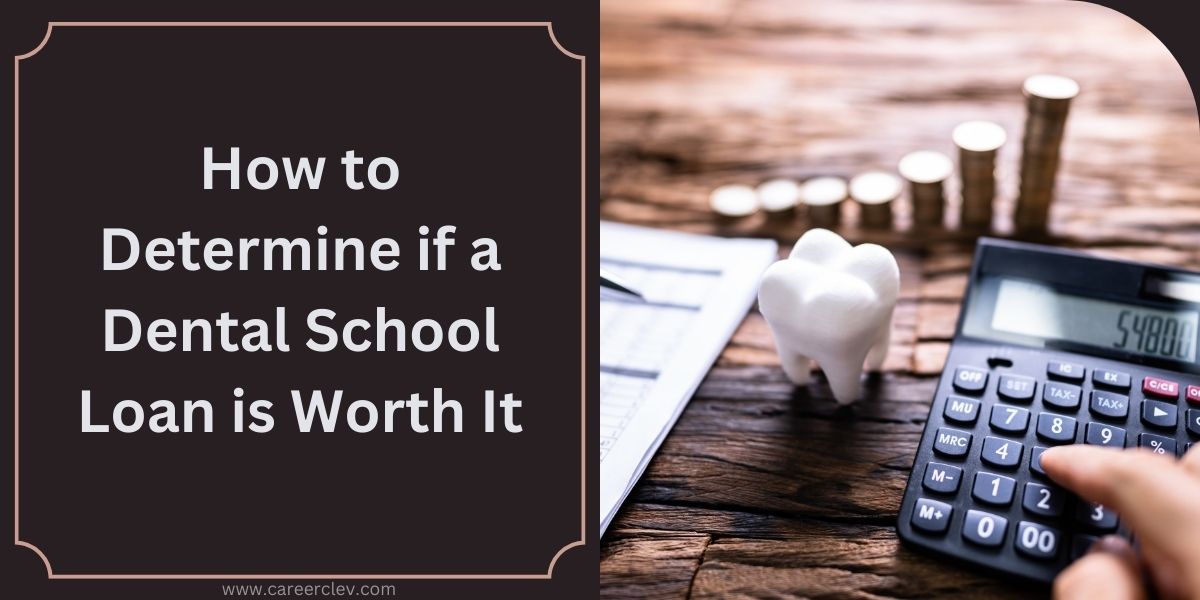Dental school can be a stepping stone to a prosperous career, but is it worth it even with all the expenses?
The average dental school debt for the class of 2020 was $304,824, making it one of the most expensive degrees available.
Fortunately, when it comes to paying, dentists have a high ceiling. Consider all of the costs and whether the return on investment is worthwhile before applying to dental school.
However, we would be discussing the average dental school debt, interest rates, how long it takes to pay back the dental loan, and how to determine if a dental school loan is worth it.
What is the average dental school debt?
So, what does it cost to train as a dentist? The average dental school debt for recent graduates is $304,824, according to data published by the ADEA.
This is substantially more than the average graduate school debt, which is $91,148 for federal borrowers, according to EducationData.org.
Of course, it is possible to graduate with less debt than the average student, but the high costs of dental school are difficult to avoid.
In the 2019–20 academic year, the American Dental Association (ADA) estimates the average cost of dental school in the first year, including tuition and fees, to be $55,395 for locals and $72,219 for non-residents.
Which makes a public dental school better to consider than a private college to keep fees down.
According to the ADA data, the average cost of dental school for the first year in public programs is $41,711, compared to $75,161 for first-year private dental programs.
Take the time to look into your options so you can find the school that will provide you with the best value for your money. You can also look for ways to earn scholarships and grants to help you pay for your education.
What are the Average Interest rates on Dental School Loans?
The typical interest rate for dental school loans varies depending on the type of student loan. For example, rates on federal student loans are standardized, so you know precisely what rate you’ll get before you apply.
On the other hand, depending on the lender and your credit situation, private loans might have a wide variety of interest rates.
Federal student loan interest rates
While federal student loan interest rates are standardized, they’re updated once a year based on larger economic trends.
With that said, the rate you receive when you take out your loan will be the rate you pay throughout that loan’s repayment. Here’s a history of rates by loan program.
Private Student Loan Interest rates
In most circumstances, federal student loans are the best option because they offer income-driven repayment schedules, forbearance periods, and forgiveness opportunities.
However, you may have reached the government’s borrowing cap, or your credit position may be excellent enough to secure better terms from a private lender.
In this case, the lender will determine your interest rates and your credit situation. Private student loan interest rates range from around 1% to slightly under 13% as of September 2021.
Private student loans can also come with either fixed or variable interest rates. Variable rates typically start lower, making them more appealing.
But over time, that rate can increase, potentially costing you more money. Fixed rates will remain the same over the life of your loan, making them the lower-risk choice.
Interest capitalization
Whether you take out federal or private student loans, the majority of them will accrue interest while you are in school.
Direct Subsidized Loans, which are offered to undergraduate students in financial need, are the only exception to this requirement.
When you graduate and your grace period expires, your lender will capitalize the interest on your account, adding it to the total and increasing both the amount you owe and the amount used to calculate future interest payments.
See the table below:
| School Year | Direct Loans for Undergraduate Students | Direct Loans for Graduate and Professional Students | Direct PLUS Loans for Parents and Graduate and Professional Students |
|---|---|---|---|
| 2021-22 | 3.73% | 5.28% | 6.28% |
| 2020-21 | 2.75% | 4.3% | 5.3% |
| 2019-20 | 4.53% | 6.08% | 7.08% |
| 2018-19 | 5.05% | 6.6% | 7.6% |
| 2017-18 | 4.45% | 6% | 7% |
| 2016-17 | 3.76% | 5.31% | 6.31% |
| 2015-16 | 4.29% | 5.84% | 6.84% |
How Long Does it take to Repay Dental School loans?
A number of factors determine the length of time it takes you to repay your dental school debt. You can set your payback period for private student loans ahead of time, with possibilities ranging from five to twenty years.
If you have private student loans and can’t afford the monthly payments under your current repayment schedule, refinancing your loans is your only option for a longer repayment period.
The normal repayment plan for federal student loans is ten years.
However, with such a large average dental school debt, keeping up with payments on that repayment timeline may be quite challenging.
Fortunately, the federal student loan program offers 30-year repayment options.
| Repayment Plan | Repayment Term |
|---|---|
| Consolidation Loan | Up to 30 years |
| Extended | 25 years |
| Pay as You Earn | 20 years |
| Revised Pay as You Earn | Up to 25 years |
| Income-Based | Up to 25 years |
| Income-Contingent | 25 years |
Your monthly payment will be limited to a percentage of your discretionary income with income-driven repayment plans like Pay As You Earn, Revised Pay As You Earn, Income-Based Repayment, and Income-Contingent Repayment.
You’ll be forgiven any remaining balance after your payback period.
What is the Average Salary for a Dentist?
The average yearly compensation for a dentist is $180,830, according to the Bureau of Labor Statistics (BLS). That is not, however, what you can expect right away.
A dentist’s beginning income, according to the New York State Department of Labor, is closer to $100,000.
Without a longer repayment period or an income-driven repayment plan, it will be more difficult to keep up with your student loan payments at the start of your job.
However, as you gain more experience, your salary will rise.
How Do I Reduce My Dental School Debt?
Dentists have plenty of opportunities to pay down their dental school debt after they’ve graduated. It’s even possible to get help from outside sources.
Student loan forgiveness
If you have federal student loans, you may qualify for the Public Service Loan Forgiveness program.
The program will discharge your debt after you make 120 qualifying monthly payments on an income-driven repayment plan while working full-time for qualifying government or not-for-profit organizations.
Student loan repayment assistance
While not considered forgiveness, since it’s not coming from the Department of Education, student loan repayment assistance is available from select government agencies, including the Armed Forces.
The ADEA maintains a list of student loan repayment programs for dentists, organized by state and federal agencies.
Student loan refinancing
To be eligible for forgiveness or repayment help, you must have federal student loans. If you’re not qualified for these programs for other reasons, or if you took out private student loans, refinancing your student loans can be a better option.
Student loan refinancing is the process of using a private lender to replace one or more existing student loans with new ones.
Student loan refinance rates may be lower than what you’re paying today, depending on your finances and credit, as well as the rates on your current debt.
You can also use refinancing to secure a longer repayment period, making your monthly payment more manageable.
How to Determine if a Dental School Loan is Worth It
Determining if a dental school loan is worthwhile is a critical choice because dental school is costly. Here are some guidelines to help you make an educated decision and also know if dental school is worth it:
Evaluate Your Career Goals
Think about your long-term dental career goals. Ask yourself, “Am I truly interested in becoming a dentist?” What particular dentistry specialty piques my interest?
Check that your commitment to the profession is commensurate with the investment you intend to make.
Research Dental School Costs
Examine the tuition, fees, and living expenses at the dental schools you’re thinking about attending. Keep in mind that prices can vary greatly among colleges.
Explore Financial Aid Options
Investigate scholarships, grants, and other forms of financial assistance. Scholarships for dental school may be awarded based on achievement or need.
The Free Application for Federal Student help (FAFSA) is a wonderful place to start when determining your eligibility for federal financial help.
Consider Loan Options
If scholarships and grants are insufficient to pay your expenses, you may need to borrow money.
In comparison to private loans, federal student loans often have lower interest rates and more flexible payback options. See the Average rates of both federal and private loans above.
Investigate and compare the many forms of federal loans available, such as Direct Subsidized and Unsubsidized Loans.
Estimate Loan Repayment
Calculate your monthly debt payments after graduation using loan calculators. Consider your anticipated income as a dentist and how it will affect your debt repayment.
You should try to keep your loan payments affordable in comparison to your projected income.
Evaluate the School’s Reputation
Check the reputation and accreditation status of the dentistry school you intend to attend. Graduation from an accredited university may improve your work prospects and earnings potential.
Job Market and Earnings
Investigate the job market and typical pay for dentists in the location or specialty of your choice. Based on your predicted income, consider how long it would take to pay off your loans.
Create a Budget and Financial Plan
Create a budget outlining your anticipated income and costs while in dental school and after graduation.
This will assist you in developing realistic financial plans and ensuring that you can satisfy your loan obligations.
Seek Professional Advice
Consult with financial advisors, career counselors, or mentors who can provide tailored advice based on your unique situation and objectives.
Alternative Paths
Seek alternatives to becoming a dentist, such as dental hygiene or dental assisting, which involve less time and expense but also allow you to work in the dental sector.
Consider Future Opportunities
Consider loan forgiveness or repayment aid programs for dentists working in underserved communities or in public health.
Personal Financial Goals
Evaluate your long-term financial aspirations, such as buying a home or starting a family, as well as how your dental school debts fit into that picture.
Is Dental School Worth it?
The decision to become a dentist is a personal one, but it’s important to weigh all of the advantages and disadvantages of attending dental school.
As you research the cost of attending dental school, graduate school loan rates, and your projected salary, you’ll have a better understanding of whether dental school is worth the investment for you.
Conclusion
Remember that incurring large debt for dentistry school is a long-term commitment, and you must balance the possible advantages with the costs.
Make an informed selection that is in line with your career goals, financial condition, and long-term objectives.



 Jobi.ng
Jobi.ng




